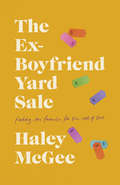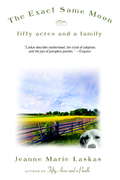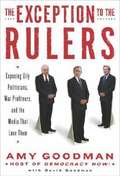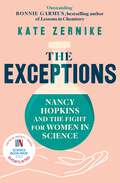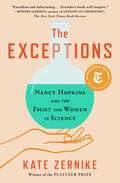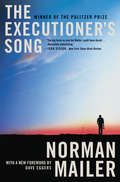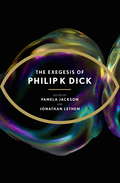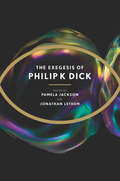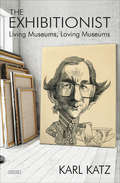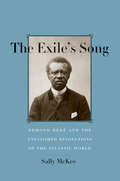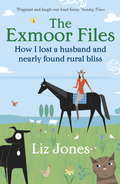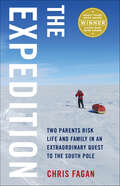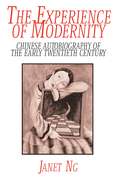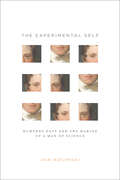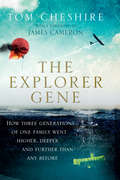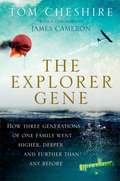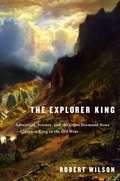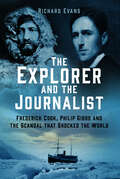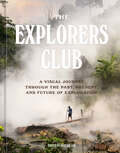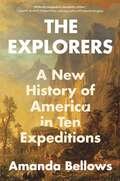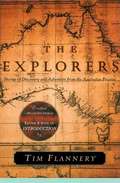- Table View
- List View
The Ex-Boyfriend Yard Sale: Finding a Formula for the Cost of Love
by Haley McGeeIn this hilarious and heartfelt memoir, Haley McGee sets out to calculate—with mathematical precision—the exact cost of love, and whether all of her former relationships were worth it.Haley McGee is in debt. The solution? A yard sale of gifts from her ex-boyfriends. But when it comes to pricing, she gets stuck. Surely the ways we invest in our romantic relationships should be reflected in the price. But how? Is the mixtape from your first love worth more than the vintage typewriter from a philanderer? Does sitting on an X-Acto knife wedged between seats on a bus to see the boyfriend you lost your virginity to increase or decrease the value of thenecklace he gave you? Should you be compensated for the miserable times or do they render an item worthless? Haley decides to gamble on a larger payout. She interviews her exes and enlists the help of a mathematician to create a formula—with eighty-six variables—for the cost of love. As she's searching for answers, the one that got away reappears with a new proposition. Female desire, heartbreak and the chance for integrity in the aftermath of both are held up in this whipsmart, original and daringly candid memoir. As Haley McGee interrogates her romantic triumphs and failures with unflinching detail and hilarity, her exquisite prose elevates this all too human conundrum: Is love worth it?
The Ex-Boyfriend Yard Sale: Finding the formula for the cost of love
by Haley McGeeCan you put a price tag on love? A quest to determine what our romantic relationships are actually worth through personal narrative, dead pan humour and the creation of a mathematical formula.Haley McGee is in debt. The solution? A yard sale of everything her ex-boyfriends have ever given her. The idea concocted during a panicked phone call to her credit-card company snowballs into a one-woman show to figure out exactly how much all the love, all the heartbreak, all the good, the bad and the boring times are actually worth. Is the mixtape from your first love worth more than the typewriter from the man who betrayed you? What about the t-shirt from your on-off partner of three years who can't quite bring himself to admit he loves you, but has found his way back into your life, again? Or if you sustained a minor physical injury (and ruined jeans) via a box cutter wedged between the seat of a bus on your way to see the guy may or may not have been dealing weed on the side? Such is Haley's determination to figure out what our failed romantic relationships are worth, she enlists the help of a mathematician to devise a formula complete with 52 variables - from market value to how much you laughed versus how often you argued- that turns sentimental value into cold hard cash.In this intelligent, original and brilliantly candid part-experiment, part-memoir, comedian and performance artist Haley McGee recounts her romantic triumphs and failures with unflinching detail and a great deal of humour.(P) 2021 Hodder & Stoughton Ltd
The Ex-Boyfriend Yard Sale: Finding the formula for the cost of love THE PERFECT SUMMER READ
by Haley McGee______________________________________________________________________________________'[T]his memoir is one of the smartest, funniest books I've read about love in a long, long time' - RED'illuminating' METROHaley McGee is in debt. The solution? A yard sale of the gifts from her ex-boyfriends. When it came to pricing, she got stuck. Surely the ways we invest in our romantic relationships should be reflected in the price. But how?Is the mixtape from your first love worth more than the vintage typewriter from a philanderer? Does sitting on a box cutter wedged between seats on bus when going to see the boyfriend you lost your virginity to increase or decrease the value of the necklace he gave you? Do the lies you told the guy who gave you a jewellery box dock its price?Should you be compensated for the miserable times or do they render an item worthless?Haley decides to gamble on a larger pay out. She interviews her exes and enlists the help of a mathematician to create a formula - with 87 variables - for the cost of love. As she wrestles her financial literacy and tackles romantic and professional woes, the one that got away reappears with a new proposition. Female desire, heartbreak and the chance for integrity are held up in this whip-smart, original and daringly candid memoir. As Haley McGee interrogates her romantic triumphs and failures with unflinching detail and hilarity her exquisite proses elevates this all too human conundrum: is love worth it?
The Exact Same Moon: Fifty Acres and a Family
by Jeanne Marie LaskasInFifty Acres and a Poodle, Jeanne Marie Laskas described how she survived her first hilariously tumultuous year at Sweetwater Farm. Now she returns with a funny, touching, and personal new memoir of what happens after your dream comes true. . . With a picture-postcard farm, a wonderful marriage, two mules, and a new refrigerator that spits crushed ice, what more can a girl ask for? That’s precisely the question Jeanne Marie asks herself as she and Alex settle into their new life at Sweetwater Farm. Two years ago they left the city behind for a life filled with the practical, often comical, lessons of living close to the land—and they never looked back. Yet when her strong-willed mom is hospitalized with a sudden and mysterious paralysis, Jeanne Marie rushes home to Philadelphia and her extended, sometimes chaotic, but always loving family. It’s there that she realizes what is still missing from her life: a family of her own. Now it’s a matter of bringing up the subject to her husband, Alex, fifteen years older and with adult children of his own, who seems terrified that she’s thinking of adopting a Chihuahua. With warmth, wisdom, and unfailing humor, Laskas tells the poignant story of her search for motherhood—and what happens when a woman risks happily-ever-after for something even more precious. As she tends to her own ailing mother, Jeanne Marie discovers that the challenges and rewards of living with Mother Nature pale in comparison to those awakened by the nature of mothering. The Exact Same Moonis filled with hilarious and heartwarming vignettes of people and a way of life you’ll be glad you met. From "borrowing" sheep to help mow the lawn and sitting in on the racy hay jokes at the Agway Equine Clinic, to befriending the notorious old lady who holds the water rights to their future pond, corrupting the neighbors with satellite TV, and learning the fine art of going a-calling, Laskas proves once again that laughter, love, and wisdom are truly homegrown. From the Hardcover edition.
The Exception to the Rulers: Exposing Oily Politicians, War Profiteers, and the Media that Love Them
by Amy Goodman David GoodmanHost of Pacifica Radio's Democracy Now! Analyzes world events.
The Exceptions: Nancy Hopkins and the fight for women in science
by Kate Zernike&‘Outstanding&’ Bonnie Garmus, bestselling author of Lessons in ChemistryThe remarkable untold story of how a group of sixteen determined women used the power of the collective and the tools of science to inspire ongoing radical change. This is a triumphant account of progress, whilst reminding us that further action is needed. These women scientists entered the work force in the 1960s during a push for affirmative action. Embarking on their careers they thought that discrimination against women was a thing of the past and that science was a pure meritocracy. Women were marginalized and minimized, especially as they grew older, their contributions stolen and erased. Written by the Pulitzer Prize-winning journalist who broke the story in 1999 for The Boston Globe, when the Massachusetts Institute of Technology made the astonishing admission that it discriminated against women on its faculty, The Exceptions is an intimate narrative which centres on Nancy Hopkins – a surprisingly reluctant feminist who became a hero to two generations of women in science. In uncovering an erased history, we are finally introduced to the hidden scientists who paved the way for collective change.
The Exceptions: Nancy Hopkins, MIT, and the Fight for Women in Science
by Kate ZernikeA New York Times Notable Book As late as 1999, women who succeeded in science were called &“exceptional&” as if it were unusual for them to be so bright. They were exceptional, not because they could succeed at science but because of all they accomplished despite the hurdles. &“Gripping…one puts down the book inspired by the women&’s grit, tenacity, and brilliance.&” —Science &“Riveting.&” —Siddhartha Mukherjee, author of The GeneIn 1963, a female student was attending a lecture given by Nobel Prize winner James Watson, then tenured at Harvard. At nineteen, she was struggling to define her future. She had given herself just ten years to fulfill her professional ambitions before starting the family she was expected to have. For women at that time, a future on the usual path of academic science was unimaginable—but during that lecture, young Nancy Hopkins fell in love with the promise of genetics. Confidently believing science to be a pure meritocracy, she embarked on a career. In 1999, Hopkins, now a noted molecular geneticist and cancer researcher at MIT, divorced and childless, found herself underpaid and denied the credit and resources given to men of lesser rank. Galvanized by the flagrant favoritism, Hopkins led a group of sixteen women on the faculty in a campaign that prompted MIT to make the historic admission that it had long discriminated against its female scientists. The sixteen women were a formidable group: their work has advanced our understanding of everything from cancer to geology, from fossil fuels to the inner workings of the human brain. And their work to highlight what they called &“21st-century discrimination&”—a subtle, stubborn, often unconscious bias—set off a national reckoning with the pervasive sexism in science. From the Pulitzer Prize–winning journalist who broke the story, The Exceptions chronicles groundbreaking science and a history-making fight for equal opportunity. It is the &“excellent and infuriating&” (The New York Times) story of how this group of determined, brilliant women used the power of the collective and the tools of science to inspire ongoing radical change. And it offers an intimate look at the passion that drives discovery, and a rare glimpse into the competitive, hierarchical world of elite science—and the women who dared to challenge it.
The Executioner's Song (Arena Bks.)
by Norman Mailer Dave EggersArguably the greatest book from America's most heroically ambitious writer, THE EXECUTIONER'S SONG follows the short, blighted life of Gary Gilmore who became famous after he robbed two men in 1976 and killed them in cold blood. <P><P>After being tried and convicted, he immediately insisted on being executed for his crime. To do so, he fought a system that seemed intent on keeping him alive long after it had sentenced him to death. And that fight for the right to die is what made him famous.<P><P> Mailer tells not only Gilmore's story, but those of the men and women caught in the web of his life and drawn into his procession toward the firing squad. All with implacable authority, steely compassion, and a restraint that evokes the parched landscape and stern theology of Gilmore's Utah. <P><P>THE EXECUTIONER'S SONG is a trip down the wrong side of the tracks to the deepest source of American loneliness and violence. It is a towering achievement-impossible to put down, impossible to forget.<P> <P><b>Pulitzer Prize Winner</b>
The Exegesis of Philip K Dick
by Philip K. DickBased on thousands of pages of typed and handwritten notes, journal entries, letters, and story sketches, The Exegesis of Philip K. Dick is the magnificent and imaginative final work of an author who dedicated his life to questioning the nature of reality and perception, the malleability of space and time, and the relationship between the human and the divine. Edited and introduced by Pamela Jackson and Jonathan Lethem, this will be the definitive presentation of Dick's brilliant, and epic, final work. In The Exegesis, Dick documents his eight-year attempt to fathom what he called "2-3-74", a postmodern visionary experience of the entire universe "transformed into information". In entries that sometimes ran to hundreds of pages, Dick tried to write his way into the heart of a cosmic mystery that tested his powers of imagination and invention to the limit, adding to, revising, and discarding theory after theory, mixing in dreams and visionary experiences as they occurred, and pulling it all together in three late novels known as the VALIS trilogy. In this abridgment, Jackson and Lethem serve as guides, taking the reader through the Exegesis and establishing connections with moments in Dick's life and work.
The Exegesis of Philip K. Dick
by Philip K. DickA glimpse into the mind of the bestselling science fiction author through a collection of his personal, metaphysical, religious, visionary writings.Based on thousands of pages of typed and handwritten notes, journal entries, letters, and story sketches, The Exegesis of Philip K. Dick is the magnificent and imaginative final work of an author who dedicated his life to questioning the nature of reality and perception, the malleability of space and time, and the relationship between the human and the divine. Edited and introduced by Pamela Jackson and Jonathan Lethem, this will be the definitive presentation of Dick&’s brilliant, and epic, final work. In The Exegesis, Dick documents his eight-year attempt to fathom what he called &“2-3-74,&” a postmodern visionary experience of the entire universe &“transformed into information.&” In entries that sometimes ran to hundreds of pages, Dick tried to write his way into the heart of a cosmic mystery that tested his powers of imagination and invention to the limit, adding to, revising, and discarding theory after theory, mixing in dreams and visionary experiences as they occurred, and pulling it all together in three late novels known as the VALIS trilogy. In this abridgment, Jackson and Lethem serve as guides, taking the reader through the Exegesis and establishing connections with moments in Dick&’s life and work.The e-book includes a sample chapter from A Scanner Darkly by Philip K. Dick. &“A dyspeptic dystopian&’s mad secret notebooks, imposing order—at least of a kind—on a chaotic world…Fascinating and unsettling.&”—Kirkus Reviews
The Exhibitionist: Living Museums, Loving Museums
by Karl KatzThe renowned curator gives a personal tour of his journey from archeology to the Met, the Jewish Museum, and helping found the Israel Museum. In The Exhibitionist, museum director Karl Katz discusses his tireless, impassioned work spanning six decades and numerous countries. As a young man, Karl traveled to the newly-formed state of Israel to pursue archaeology, only to be thrust into the role of directing the Bezalel National Art Museum in Jerusalem. From that early trial by fire to his many leadership roles at the Museum of Tolerance, the International Center of Photography, the Metropolitan Museum of Art, and elsewhere, Katz found innovative ways to make museums inviting, educational, living, and vibrant. A book for lovers of history and art criticism, as well as collectors, curators, administrators, and students, The Exhibitionist is filled with a wide range of discussions both cultural and personal. Katz discusses the exhibits, the discoveries, and the incredible people he worked with along the way, from his mentor Teddy Kollek, the mayor of Jerusalem and founder of the Israel Museum, to Jaqueline Kennedy Onassis and Broadway showman Billy Rose.
The Exile's Song: Edmond Dédé and the Unfinished Revolutions of the Atlantic World
by Sally MckeeThe extraordinary story of African American composer Edmond Dédé, raised in antebellum New Orleans, and his remarkable career in France In 1855, Edmond Dédé, a free black composer from New Orleans, emigrated to Paris. There he trained with France’s best classical musicians and went on to spend thirty-six years in Bordeaux leading the city’s most popular orchestras. How did this African American, raised in the biggest slave market in the United States, come to compose ballets for one of the best theaters outside of Paris and gain recognition as one of Bordeaux’s most popular orchestra leaders? Beginning with his birth in antebellum New Orleans in 1827 and ending with his death in Paris in 1901, Sally McKee vividly recounts the life of this extraordinary man. From the Crescent City to the City of Light and on to the raucous music halls of Bordeaux, this intimate narrative history brings to life the lost world of exiles and travelers in a rapidly modernizing world that threatened to leave the most vulnerable behind.
The Exmoor Files: How I Lost A Husband And Found Rural Bliss
by Liz JonesMoving from Islington to Exmoor; one small step for mankind but a very large one for MAIL ON SUNDAY columnist Liz Jones.Liz Jones lived the perfect urban life. The immaculate Georgian townhouse in a leafy London square. The glamorous career. The Italian wardrobe stuffed with designer bags and shoes. The much younger novelist husband. But then it all goes horribly wrong. She discovers her husband has been having numerous affairs (with women who are younger, dimmer, slimmer) and realises that her pursuit of perfection has never made her happy, and probably never will. And so she decides to start all over again, burying herself alive in the middle of the bleak, unforgiving wilderness that is Exmoor National Park. She buys a wreck of a farmhouse, with an original stable block, 46 acres, an ancient wood and a lake. She rescues a nervous and abused but breathtakingly beautiful racehorse and hopes to live out the rural dream. The reality, of course, is much, much harder. THE EXMOOR FILES is a funny, honest, often brutal real-life account of what it is like to start all over again in an alien environment. It is about discovering that you cannot find peace just by moving somewhere peaceful. It is about mourning for a relationship and letting go of the life you thought you deserved.
The Exmoor Files: How I Lost A Husband And Found Rural Bliss
by Liz JonesMoving from Islington to Exmoor; one small step for mankind but a very large one for MAIL ON SUNDAY columnist Liz Jones.Liz Jones lived the perfect urban life. The immaculate Georgian townhouse in a leafy London square. The glamorous career. The Italian wardrobe stuffed with designer bags and shoes. The much younger novelist husband. But then it all goes horribly wrong. She discovers her husband has been having numerous affairs (with women who are younger, dimmer, slimmer) and realises that her pursuit of perfection has never made her happy, and probably never will. And so she decides to start all over again, burying herself alive in the middle of the bleak, unforgiving wilderness that is Exmoor National Park. She buys a wreck of a farmhouse, with an original stable block, 46 acres, an ancient wood and a lake. She rescues a nervous and abused but breathtakingly beautiful racehorse and hopes to live out the rural dream. The reality, of course, is much, much harder. THE EXMOOR FILES is a funny, honest, often brutal real-life account of what it is like to start all over again in an alien environment. It is about discovering that you cannot find peace just by moving somewhere peaceful. It is about mourning for a relationship and letting go of the life you thought you deserved.
The Expedition: Two Parents Risk Life and Family in an Extraordinary Quest to the South Pole
by Chris FaganMeet Chris and Marty—a married couple working on their careers, raising their only child, and chasing big adventures. At midlife, they suddenly find themselves weighing the responsibility of parenthood against the possibility of one more grand adventure, before their aging bodies and the warming continent of Antarctica further degrade. They ultimately decide it’s time to pursue their biggest dream: Ski 570 miles from the edge of Antarctica to the South Pole. With no guide or resupply. From the lush Pacific Northwest to the barren landscape of Antarctica, Chris and Marty embark on one of the hardest challenges on the planet. After three years of intense planning and training, including meticulous preparations for the care of their twelve-year-old son, they are ready. Experience a boundless white wonderland like no other on earth. Encounter life-threatening dangers lurking in the bitter cold. Feel the intensity of 220-pound sleds, relentless wind, 40-below temperatures, and mind-numbing isolation. This is not an average couples getaway. Chris and Marty go where few others have dared on the way to making history—stretching their bodies, minds, and marriage to the limit in the process. Riveting and inspiring, The Expedition is about the power of family and community, the adventurous spirit that dwells within us all, and breaking through to feel fully alive.
The Experience of Modernity: Chinese Autobiography of the Early Twentieth Century
by Janet NgAutobiography of the first half of the twentieth century was used variously by different groups of writers to interrogate, negotiate, and even to program the social and political progress of China. However, despite the popularity and success of this genre, it has also been the most forgotten in literary and historical discussions. Personal stories and individual expressions seem to have had no place in 1920s, 1930s, and 1940s China, smothered instead by the grander rhetoric of nationalism. For this reason, autobiography's popularity during the era is an odd phenomenon and also an important genre for study. The May Fourth Era (1917-40) began as a movement to make the classical literary language accessible to the common people and became a broader political movement against imperialism. The writing of autobiography was influenced by the idea of literature's social and political mission, yet at the same time autobiography was a uniquely potent venue for individual expression. Janet Ng examines this notion in The Experience of Modernity within the framework of autobiographical writings by Chen Hengzhe, Lu Xun, Hu Shi, Xie Bingying, Xiao Hong, Eileen Chang, Yu Dafu, and Shen Congwen. Janet Ng is Assistant Professor of Asian Literature, the College of Staten.
The Experimental Self: Humphry Davy and the Making of a Man of Science
by Jan GolinskiWhat did it mean to be a scientist before the profession itself existed? Jan Golinski finds an answer in the remarkable career of Humphry Davy, the foremost chemist of his day and one of the most distinguished British men of science of the nineteenth century. Originally a country boy from a modest background, Davy was propelled by his scientific accomplishments to a knighthood and the presidency of the Royal Society. An enigmatic figure to his contemporaries, Davy has continued to elude the efforts of biographers to classify him: poet, friend to Coleridge and Wordsworth, author of travel narratives and a book on fishing, chemist and inventor of the miners' safety lamp. What are we to make of such a man? In The Experimental Self, Golinski argues that Davy's life is best understood as a prolonged process of self-experimentation. He follows Davy from his youthful enthusiasm for physiological experiment through his self-fashioning as a man of science in a period when the path to a scientific career was not as well-trodden as it is today. What emerges is a portrait of Davy as a creative fashioner of his own identity through a lifelong series of experiments in selfhood.
The Explorations of Pere Marquette
by Jim KjelgaardThis book presents the adventures of a real hero, greater than those created by fiction.
The Explorer Gene: How Three Generations of One Family Went Higher, Deeper and Further Than Anyone Before
by Tom CheshireThis is a remarkable story, not just about the extraordinary achievements of a family, but about the power of the individual to spur innovation, even when the consen
The Explorer Gene: How Three Generations of One Family Went Higher, Deeper, and Further Than Any Before
by Thomas CheshireOn May 27, 1931, Auguste Piccard became the first human to enter the stratosphere, flying an experimental balloon he invented himself. Thirty years later, his son Jacques went to the bottom of the earth, descending to the Mariana Trench in a submarine built by him and Auguste. To this day, no one has gone deeper. Bertrand, the third generation, was the first person to fly around the world non-stop in a balloon. Now, he's building his own craft: a solar-powered plane to circumnavigate the globe. In "The Explorer Gene," Tom Cheshire asks how three generations of one family achieved such extraordinary feats, often with the consensus against them. None of the Piccards set out to explore: Auguste was a physicist, Jacques an economist and Bertrand a psychiatrist. Was it fate, a famous family name - or their explorer gene?
The Explorer King
by Robert WilsonIn this, one of the year's most compelling biographies, Robert Wilson paints a brilliant portrait of Clarence King -- a scientist-explorer whose mountain-scaling, desert-crossing, river-fording, blizzard-surviving adventures helped create the new West of the nineteenth century. A sort of Howard Hughes of the 1800s, Clarence King in his youth was an icon of the new America: a man of both action and intellect, who combined science and adventure with romanticism and charm. The Explorer King vividly depicts King's amazing feats and also uncovers the reasons for the shocking decline he suffered after his days on the American frontier. The Yale-educated King went west in 1863 at age twenty-one as a geologist-explorer. During the next decade he scaled the highest peaks of the Sierra Nevada, published a popular book now considered a classic of adventure literature, initiated a groundbreaking land survey of the American West, and ultimately uncovered one of the greatest frauds of the century -- the Great Diamond Hoax, a discovery that made him an international celebrity at a time when they were few and far between. Through King's own rollicking tales, some true, some embroidered, of scaling previously unclimbed mountain peaks, of surviving a monster blizzard near Yosemite, of escaping ambush and capture by Indians, of being chased on horseback for two days by angry bandits, Robert Wilson offers a powerful combination of adventure, history, and nature writing. He also provides the bigger picture of the West at this time, showing the ways in which the terrain of the western United States was measured and charted and mastered, and how science, politics, and business began to intersect and influence one another during this era. Ultimately, King himself would come to symbolize the collision of science and business, possibly the source of his downfall. Fascinating and extensive, The Explorer King movingly portrays the America of the nineteenth century and the man who -- for better or worse -- typified the soul of the era.
The Explorer and the Journalist: Frederick Cook, Philip Gibbs and the Scandal that Shocked the World
by Richard EvansOn 1 September 1909, a telegram from American explorer Frederick Cook caused perhaps the biggest sensation in polar exploration history. With no word from Cook for over a year and many assuming he was dead, here came the news that not only had he survived his Arctic expedition, but he had claimed one of the great prizes in exploration by becoming the first person to reach the North Pole.Cook was instantly transformed into one of the heroes of the age. And with his boat due to arrive in Copenhagen a few days later, the world’s journalists scrambled to get there in time to meet him. One of those journalists was Philip Gibbs, a young reporter for the Daily Chronicle in London, who had a chance encounter in a Copenhagen café that led to him getting an exclusive interview with Cook before he reached land. But Gibbs left the interview doubting Cook’s story, and so in his subsequent article he decided to gamble both his career and his reputation by making it clear he thought Cook might be lying.Gibbs’s article made him the most unpopular man in Copenhagen, and marked the start of a frantic six days during which Copenhagen showered Cook with accolades while Gibbs tried to prove his claim was untrue. The Explorer and the Journalist is the story of the explorer who was determined to prove he really had reached the Pole, and the journalist who was convinced he was a fraud. It was a confrontation from which only one of them would emerge with his reputation intact…
The Explorers Club: A Visual Journey Through the Past, Present, and Future of Exploration
by The Explorers ClubDiscover the extraordinary history and thrilling frontiers of exploration with this gorgeously illustrated guide from The Explorers Club, the esteemed home of the world's most prominent explorers.The discovery of the North and South Poles. The summiting of Everest. The moon landing. The (largely unknown) birth of climate change science. These are just some of the stories from The Explorers Club, the organization that, since its inception in 1904, has pushed the envelope of human curiosity.This guided tour of The Club&’s most riveting journeys includes hundreds of photos and fascinating anecdotes about The Club&’s distinguished members, including Teddy Roosevelt, Neil Armstrong, and Jane Goodall. From the darkest depths of the ocean to the highest points on Earth and to outer space and beyond, this book shares not just the inspirational history of modern exploration, but also reveals how it has evolved and continues to be relevant—even urgent—today.
The Explorers: A New History of America in Ten Expeditions
by Amanda BellowsA fascinating new history of America, told through the stories of a diverse cast of ten extraordinary—and often overlooked—adventurers, from Sacagawea to Matthew Henson to Sally Ride, who pushed the boundaries of discovery and determined our national destiny."Brilliantly imaginative, beautifully written." —David Blight, Pulitzer Prize-winning author of Frederick Douglass: Prophet of FreedomThe archetype of the American explorer, a rugged white man, has dominated our popular culture since the late eighteenth century, when Daniel Boone’s autobiography captivated readers with tales of treacherous journeys. But our commonly held ideas about American exploration do not tell the whole story—far from it.The Explorers rediscovers a diverse group of Americans who went to the western frontier and beyond, traversing the farthest reaches of the globe and even penetrating outer space in their endeavor to find the unknown. Many escaped from lives circumscribed by racism, sexism, poverty, and discrimination as they took on great risk in unfamiliar territory. Born into slavery, James Beckwourth found freedom as a mountain man and became one of the great entrepreneurs of Gold Rush California. Matthew Henson, the son of African American sharecroppers, left rural Maryland behind to seek the North Pole. Women like Harriet Chalmers Adams ascended Peruvian mountains to gain geographic knowledge while Amelia Earhart and Sally Ride shattered glass ceilings by pushing the limits of flight.In The Explorers, readers will travel across the vast Great Plains and into the heights of the Sierra Nevada mountains; they will traverse the frozen Arctic Ocean and descend into the jungles of South America; they will journey by canoe and horseback, train and dogsled, airplane and space shuttle. Readers will experience the exhilarating history of American exploration alongside the men and women who shared a deep drive to discover the unknown.Across two centuries and many thousands of miles of terrain, Amanda Bellows offers an ode to our country’s most intrepid adventurers—and reveals the history of America in the process.
The Explorers: Stories of Discovery and Adventure from the Australian Frontier
by Tim FlanneryIn this lively collection of stories of adventure and discovery, "The Explorers" tells the epic saga of the conquest and settlement of Australia. Flannery presents 67 accounts that convey the sense of wonder along with the dimensions of struggle.
